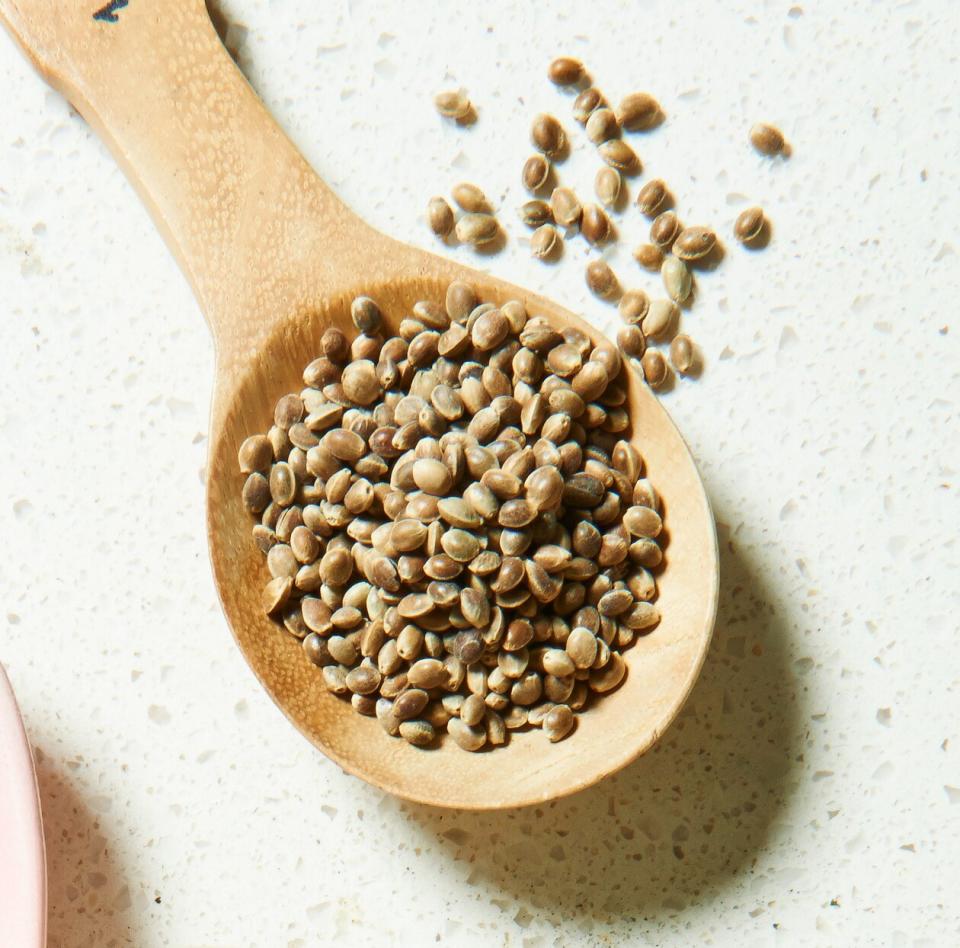Hemp Seeds Are the Fiber-Packed Ingredient You Need in Your Diet
Step aside, avocado. Back away, plant-based burger. Make room, feta pasta. Another year brings another lot of trendy ingredients and dishes. And while the mighty hemp seed is nothing novel, its popularity has been spiking, likely due to its association with marijuana. While the nutrient-packed ingredient is related to the cannabis plant, hemp has little to no trace of tetrahydrocannabinol (THC), meaning you can nosh on it and not worry about mind-altering effects. Instead, you get a nutty, fiber, and antioxidant-heavy seed to toss on your morning muesli or even into a cake.
Looking to get in on the hemp trend and try it yourself? We've got answers to all of your burning questions.

Andy Lyons
What Are Hemp Seeds?
In a nutshell (pun intended), hemp seeds are seeds (technically nuts) of a hemp plant (Cannabis sativa). They have zero to a little amount of THC (which produces weed's mind-altering effects) and are safe to consume on a daily basis.
Typically, hemp seeds are hulled before they are packaged and sold, though it is completely safe to eat them with their shells still intact. In fact, many people prefer the added crunch.
How to Use Hemp Seeds
The soft, almost walnut-like texture lends itself to a variety of uses in the kitchen. They taste like pine nuts and sunflower seeds and can be incorporated (raw, roasted, or cooked) into both sweet and savory dishes. Some popular ideas include toppers for oatmeal, salads, roasted vegetables, yogurt, and smoothies. They also make fantastic garnishes for baked goods like bread and muffins.
Hemp seeds can also be cold-pressed (similar to the process of olive oil) to create hemp oil, which can be ingested or applied topically to treat skin conditions like eczema and acne.
Hemp Seed Health Benefits
Perhaps the most appealing aspect of investing in hemp seeds is its abundance of health benefits. Not only are they a fantastic source of protein (nearly 10 grams in only three tablespoons), but they're high in healthy fats, much like flax seeds, boasting two essential fatty acids: linoleic (omega-6) and alpha-linolenic (omega-3). These have been proven to lower blood pressure and reduce triglycerides.
Additionally, hemp seeds are chock-full of vitamins and minerals like magnesium, calcium, iron, vitamin E, phosphorus, and potassium. Several of these are dietary components of public concern in the United States. They are also high in fiber, which is a key to good digestion.
One interesting study shows that hemp seeds, which also contain gamma-linolenic acid (GLA), may actually reduce the severity of premenstrual syndrome (PMS) symptoms in women. This is due to GLA's ability to produce prostaglandin E1, which reduces the effects of prolactin (a hormone that elevates during a menstrual cycle).
Where to Buy Hemp Seeds
What was once found only in specialty health stores, the hemp seed is now as mainstream as the peanut. (Okay, maybe not quite on that level, but they're not difficult to find.) Online retailers like Amazon carry bags of them in bulk, and since they can be quite pricey, bulk buying is a way to help curb costs in the long term.
Otherwise, many major grocery stores like Whole Foods carry hemp seeds, which can typically be found in the nut and seed section. Or, check the health food section of your local grocery store.
There are many natural foods touted as the next "it" ingredient to weave into popular diets, but hemp seeds have already passed the test and are certifiably some of the healthiest things you can add to your favorite meals. So the next time you're looking to jazz up a yogurt parfait, grab a handful, toss them in, and enjoy the low-carb crumbles that will not only satisfy a nutty craving but help keep you full longer.

